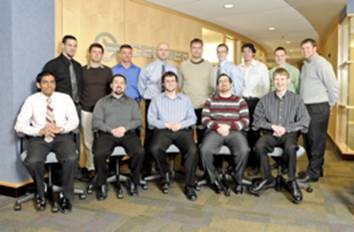Metropolitan Community College-Kansas City: Collaboration With Global IT Giant to Develop Talent
Cerner Corporation, a global health information company with headquarters in North Kansas City, has roughly 10,000 employees and licenses health information solutions to more than 9,000 facilities worldwide. Now in its fourth decade, the company has an annual revenue of $1.9 billion—and there is no slow-down in sight. To meet the workforce needs of current and future growth in the constantly transforming industry of digital medical records, Cerner needs a constant pipeline of sharp, skilled prospective employees. That's where the company's partnership with Metropolitan Community College-Kansas City comes in.
Cerner partnered with Metropolitan Community College (MCC) to develop KCIT, a career education and development program that couples part-time paid Cerner internships with relevant college coursework to accelerate learning and help students develop the soft skills required to be successful in the workplace.
Every semester, Cerner representatives visit each of MCC's five campuses to interview and recruit students for KCIT. Launched in 2010, the program has included students from MCC's stationary engineering, Cisco Networking Academy, computer science/information systems, and business degree programs.

Members of the first cohort of KCIT participants posed for a photo at
Cerner's state-of-the-art headquarters complex in North Kansas City.
Cerner only recently began to think of community colleges as a viable source for strong candidates for their high-skill, fast-paced professional positions, admits Troy Teague, Cerner's manager of talent development recruiting.
"Cerner has traditionally recruited from four-year universities to fill our technology and software engineering needs," said Teague, "But we have seen a steady decline in available talent in the market."
The company has seen a lot of benefits since the KCIT program began, said Teague. In addition to developing relevant skills more quickly, he said, the program has allowed the company to increase its candidate pool for hard-to-fill technical roles and has caused the company to create new points of entry that do not require a bachelor's degree.
Cerner still recruits from four-year institutions, Teague said, but has expanded their recruitment efforts to also include hiring and fostering promising talent who have not yet received a college degree.
"With growing demands in STEM careers, and a shallow pool of talent to fill them, companies like Cerner have to constantly evaluate recruiting strategies and look for new opportunities to engage students early in their educational careers," said Teague.
Cerner develops key partnerships that allow us to be part of the education process through cultivating skills, creating awareness of STEM careers, and connecting industry with education. With the creation of the KCIT program we were able to find mutual benefit with MCC as the college works to give students every opportunity for future employment.
Using the KCIT model, MCC has created similar internship programs, including partnerships with engineering firm Sega, with several local manufacturing facilities through MCC-Business & Technology's manufacturing consortium, and through a recent grant to train and place students in the health informatics and health-care building maintenance fields.










